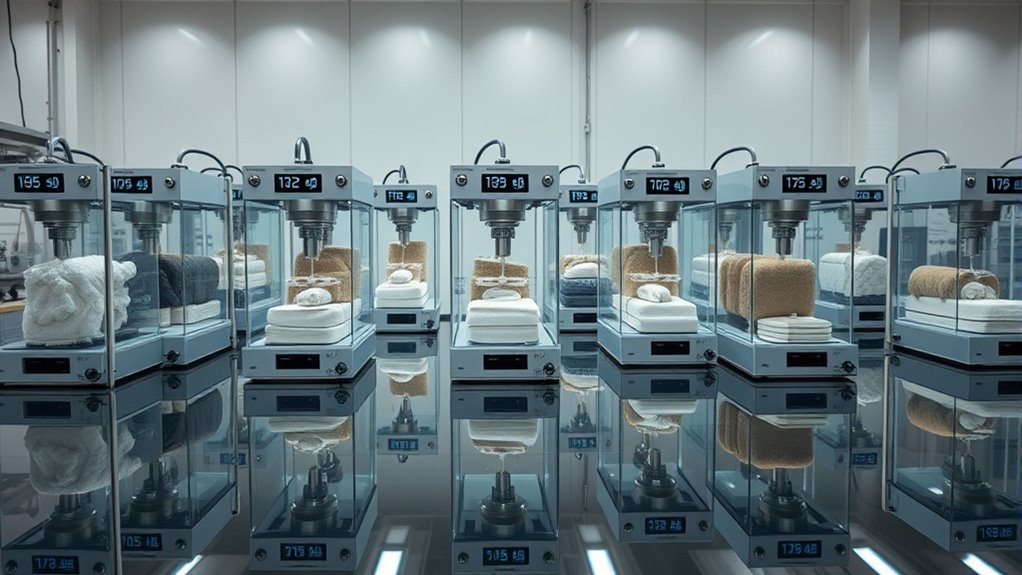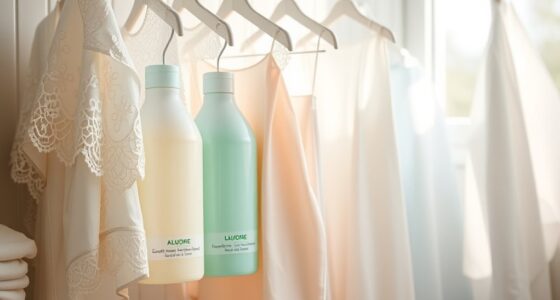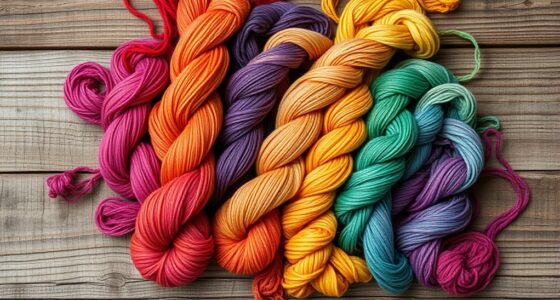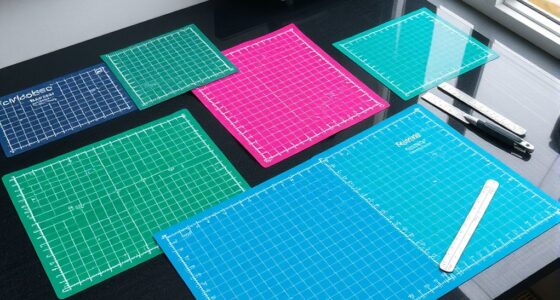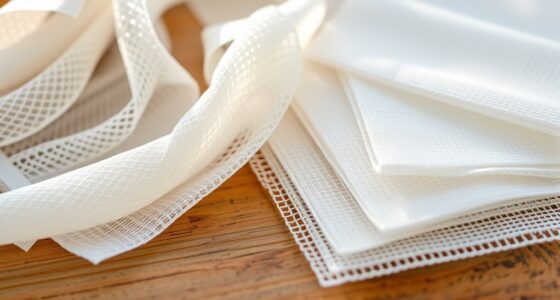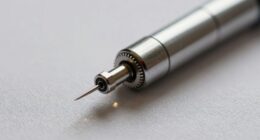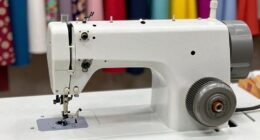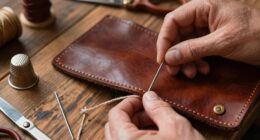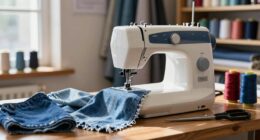If you’re looking for the 15 best fabric shrinkage testers to guarantee a perfect fit and high-quality standards, I recommend tools like the ATCC Shrinkage Scale, Carson LinenTest, and Everhard seam testers. These help you measure fabric shrinkage, inspect stitches, and test seams quickly and accurately. They’re versatile and durable, perfect for both home and professional use. Keep exploring if you want to discover more about getting precise measurements and better results.
Key Takeaways
- The list includes precise measurement tools like the ATCC Shrinkage Scale for accurate fabric dimensional testing.
- Inspection devices such as Carson® LinenTest™ help verify fabric quality and stitch integrity.
- Seam testers like Everhard models quickly assess seam durability in fabrics and roofing materials.
- Versatile tools like the Clover Sliding Gauge serve multiple functions, including measuring hems and buttonholes.
- Moisture meters like MS-C ensure fabrics meet quality standards by measuring moisture content accurately.
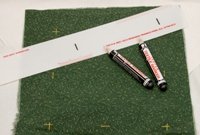
ATCC Shrinkage Scale
As an affiliate, we earn on qualifying purchases.
ATCC Shrinkage Scale
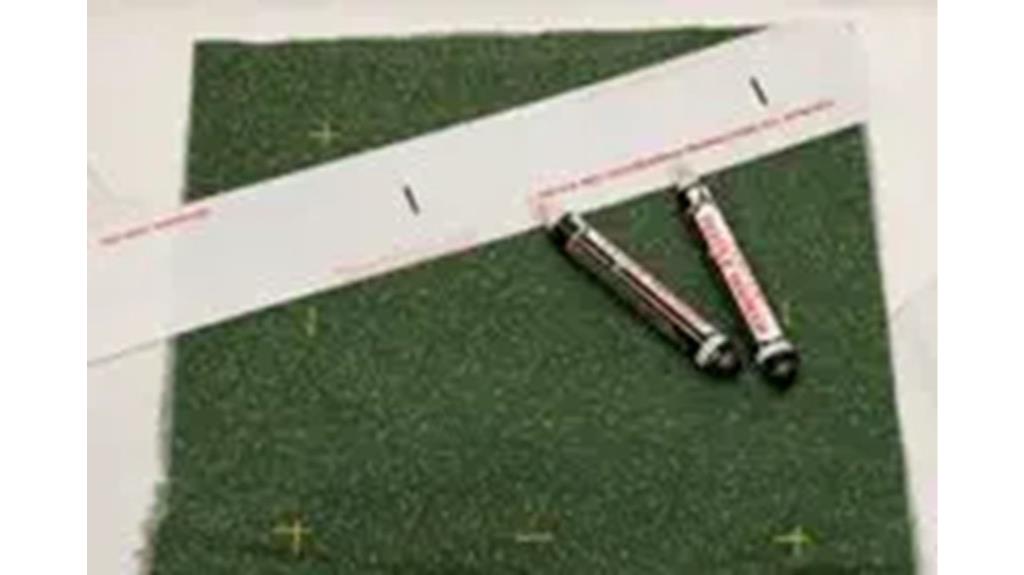
The ATCC Shrinkage Scale is ideal for professionals who need quick, accurate measurements of fabric dimensional changes during laundering tests. I find it incredibly useful because it allows me to mark and measure specimens easily, thanks to its clear benchmarks in 8, 10, and 18 inches. The scale enables direct reading of percent change without any calculations, saving time and reducing errors. It’s compatible with key AATCC test methods for evaluating fabric shrinkage after home or commercial laundering. Since its first release in 2016, the scale remains reliable, helping me ensure fabric quality and fit with confidence and efficiency.
Best For: professionals and laboratory technicians needing rapid, precise measurement of fabric dimensional changes during laundering tests.
Pros:
- Allows quick and easy marking and measurement of specimens without complex calculations
- Features clear benchmarks in 8, 10, and 18 inches for straightforward reading
- Compatible with multiple AATCC test methods, ensuring versatile application
Cons:
- Limited to fabric testing and not suitable for other measurement needs
- May require careful handling to ensure accurate placement on specimens
- Availability might be restricted depending on supplier stock or geographic location

Carson® Metal LinenTest™ 6.5x20mm Metal Linen Tester with Pouch (LT-60)
Metal, compact, fold- out Linen Test Magnifier
As an affiliate, we earn on qualifying purchases.
Carson® Metal LinenTest™ 6.5x20mm Metal Linen Tester with Pouch (LT-60)
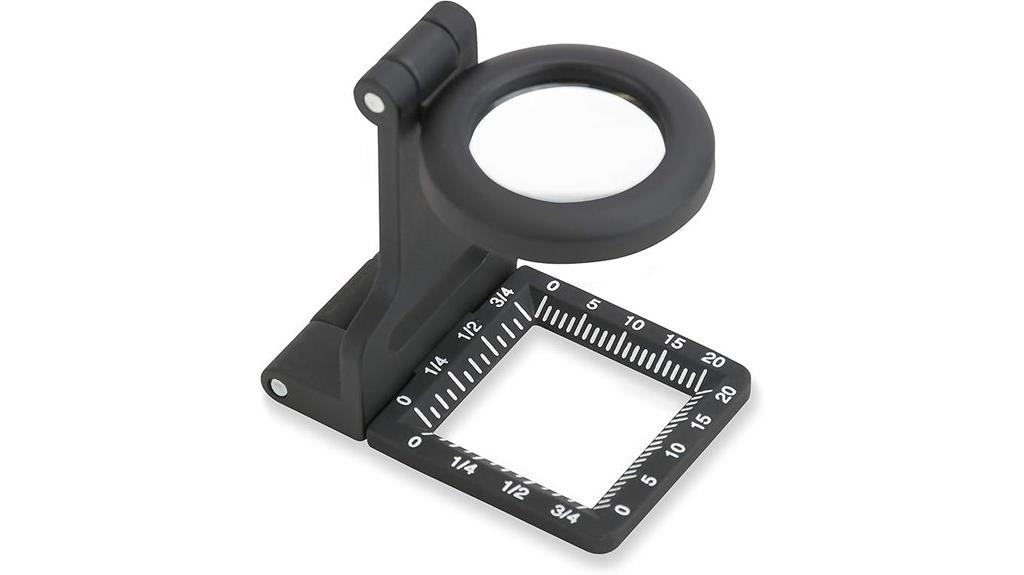
If you need a reliable magnifier for detailed fabric inspection or stitch counting, the Carson® Metal LinenTest™ 6.5x20mm Metal Linen Tester with Pouch (LT-60) is an excellent choice. Its sturdy metal frame and 6.5x magnification with a 20mm glass lens provide sharp, clear views of tiny details. Compact and lightweight at just over 42 grams, it folds flat for easy portability and includes a soft pouch for protection. Markings in inches and centimeters ensure precise measurements. Perfect for textile professionals, hobbyists, or anyone needing close-up inspection, this magnifier combines durability with ease of use for accurate fabric analysis.
Best For: those who need a compact, durable magnifier for detailed fabric inspection, stitch counting, or small part measurement, suitable for both professionals and hobbyists.
Pros:
- Sturdy metal frame and glass lens ensure durability and clear images
- Compact, lightweight design folds flat for portability and includes a soft pouch
- Markings in both inches and centimeters allow for precise measurements
Cons:
- Small size may be limiting for users needing larger viewing areas
- Plastic parts are lightweight but may feel less robust over time
- Not equipped with electronic features like LED lighting or adjustable focus

Everhard Chek-N-Fold Seam Tester MM21120
Liner lock closure mechanism has over sized opening for easy fold-away
As an affiliate, we earn on qualifying purchases.
Everhard Chek-N-Fold Seam Tester MM21120
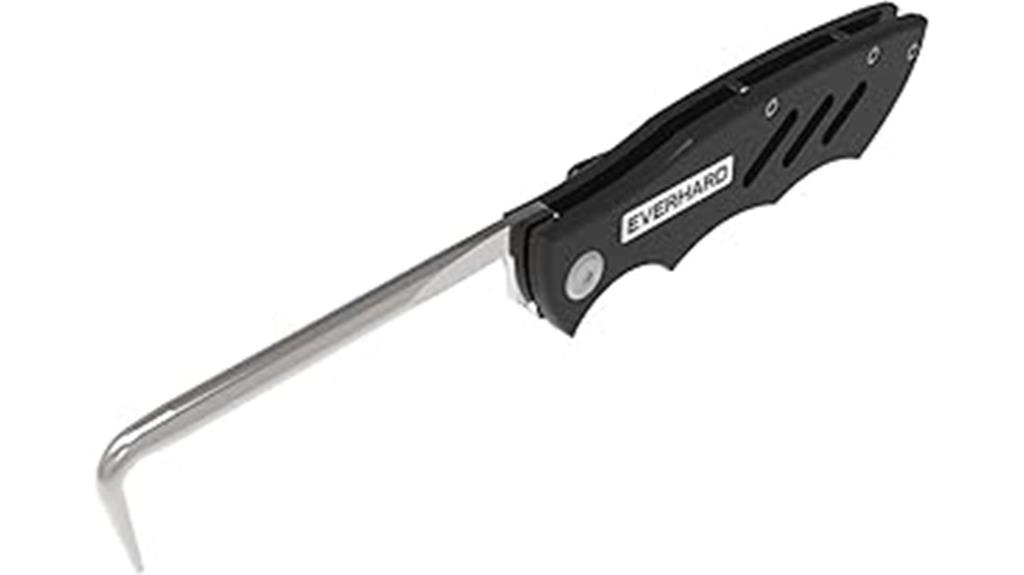
For roofing professionals seeking a portable and accurate seam testing tool, the Everhard Chek-N-Fold Seam Tester MM21120 stands out. Its compact, foldable design makes it easy to carry in pockets or attach to belts, perfect for quick inspections on the go. The tool features a durable, heat-treated steel hook that locks securely when opened, ensuring precise seam measurements. Its ergonomic plastic handle with finger grips provides comfort and control during use. Weighing only 0.2 pounds, it’s lightweight yet sturdy. Built without batteries, it offers reliable mechanical accuracy, making it an excellent choice for on-site seam testing and quality assurance.
Best For: roofing professionals who need a portable, accurate, and easy-to-carry seam testing tool for quick inspections on-site.
Pros:
- Compact, foldable design for easy storage and portability
- Durable heat-treated steel hook with a secure locking mechanism
- Ergonomic plastic handle with finger grips for comfortable use
Cons:
- Some users report the probe snapping or breaking after minimal use
- Durability issues may require additional modifications like applying Loctite
- Slightly higher prices in recent months may affect perceived value

Clover Supersize 5-in-1 Sliding Gauge
A multi-functional sliding gauge for easy marking. Use this handy tool for marking button holes; seam allowance gauge;...
As an affiliate, we earn on qualifying purchases.
Clover Supersize 5-in-1 Sliding Gauge
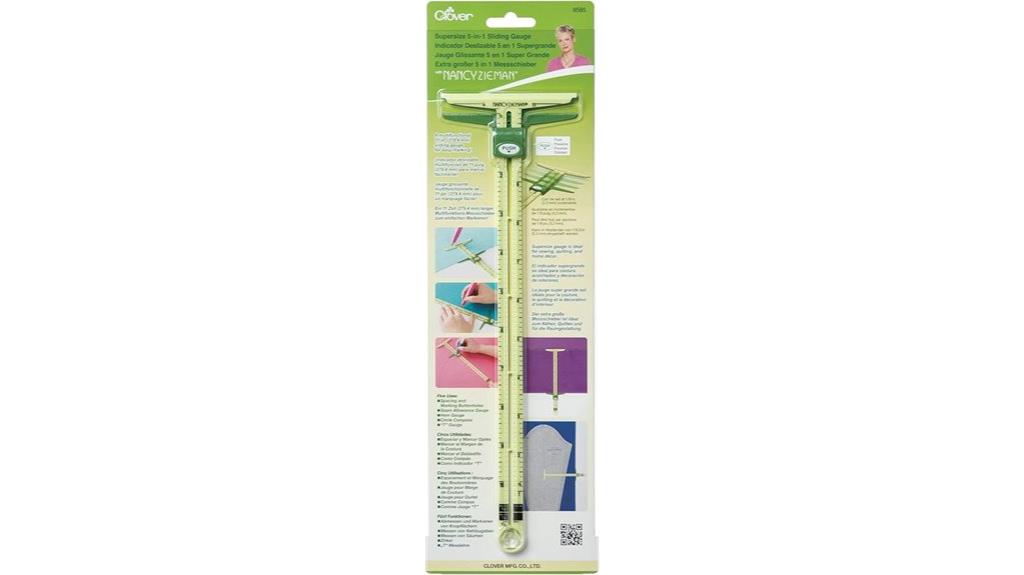
When working on sewing and craft projects that require precise measurements, the Clover Supersize 5-in-1 Sliding Gauge stands out as an essential tool. Its adjustable range from 0 to 5 inches in 1/8-inch increments makes it versatile for various tasks. I use it as a buttonhole marker, seam allowance gauge, hem guide, circle compass, and T gauge. Made of durable plastic, it’s lightweight and easy to handle. Whether I’m sewing or doing paper crafts like scrapbooking and card making, this compact tool simplifies marking. Its multifunctionality helps me achieve accurate measurements quickly, ensuring my projects fit perfectly and look professional.
Best For: crafters, sewists, and DIY enthusiasts seeking a versatile, precise measuring tool for sewing and craft projects.
Pros:
- Multi-functional tool serving as a buttonhole marker, seam allowance gauge, hem gauge, circle compass, and T gauge.
- Adjustable from 0 to 5 inches in 1/8-inch increments for precise measurements.
- Made of durable, lightweight plastic, making it easy to handle and carry.
Cons:
- Being made of plastic, it may be less durable than metal tools over extended heavy use.
- Limited to measurements up to 5 inches, which may not suit larger projects.
- Imported construction might mean higher cost or limited availability in some regions.
Everhard Convertible Seam Tester – Soft Grip Handle
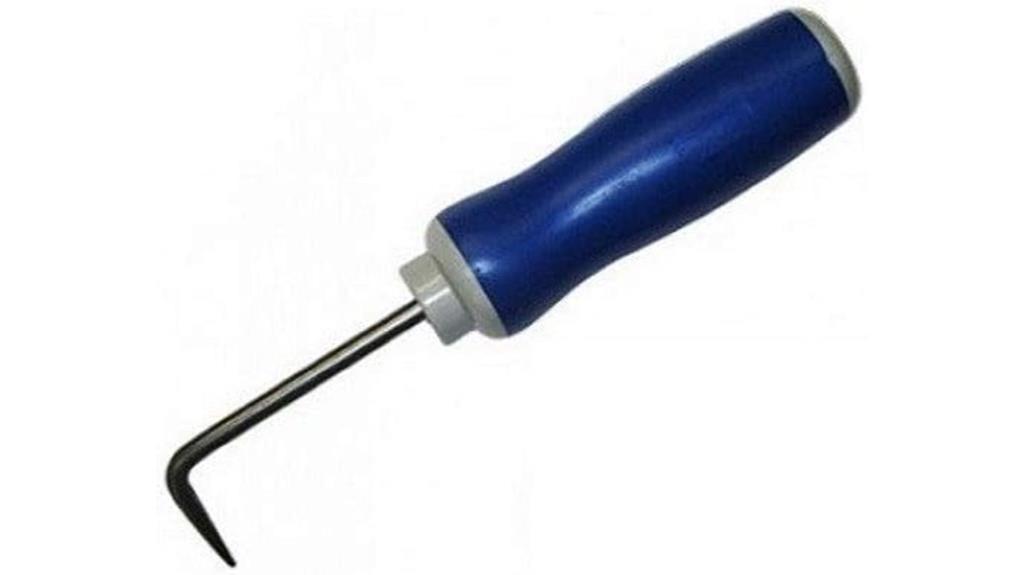
The Everhard Convertible Seam Tester with a soft grip handle is an ideal choice for professionals and hobbyists who need a reliable and comfortable tool for fabric testing. Its 5-inch plastic handle features a soft grip, ensuring secure, comfortable use during testing. The threaded handle allows for extension attachment, making it versatile for standing use. Made from durable plastic with alloy steel components, it’s built to last and easy to install. The ambidextrous design suits various hand orientations, enhancing ease of use. With a compact size and weight of just 5.6 ounces, it’s a practical addition to any fabric testing toolkit.
Best For: professionals and hobbyists seeking a durable, comfortable, and versatile fabric seam testing tool.
Pros:
- Soft grip handle provides secure and comfortable testing experience
- Extension attachment allows for standing use, increasing versatility
- Durable plastic and alloy steel construction ensures long-lasting performance
Cons:
- Limited projection distance of 5 inches may not suit all testing needs
- Slightly heavier at 5.6 ounces, which may affect prolonged use comfort for some users
- Requires sign-in for feedback submission, which might be inconvenient for some customers
MS-C Needle Type Textile Moisture Meter for Textile Materials

If you need quick, accurate moisture readings on various textile materials, the MS-C Needle Type Textile Moisture Meter is an excellent choice. This portable device provides instant measurements for cotton, wool, silk, hemp, and more, making it ideal for quality control and research. Its digital LCD display with backlight guarantees clear readings even in low-light environments. With a measurement range of 4% to 90% and an accuracy of ±0.5%, it delivers reliable results fast. Compact and lightweight at just 119 grams, it supports on-site testing, helping you maintain consistent fabric quality efficiently.
Best For: professionals in textile manufacturing, quality control inspectors, and researchers needing rapid, accurate moisture measurements of various textile materials on-site.
Pros:
- Provides instant, accurate moisture readings with a wide range of 4% to 90% and ±0.5% precision
- Portable, compact, and lightweight design facilitates easy on-site testing in diverse environments
- Features a digital LCD with backlight, data hold, and low battery alert for user convenience
Cons:
- Requires four AAA batteries, which are not included and need to be purchased separately
- Limited to textile materials, not suitable for moisture measurement in other types of materials
- May require calibration or careful handling to maintain measurement accuracy over time
SHAHE DTF Yarn Tension Meter for Textile Industry
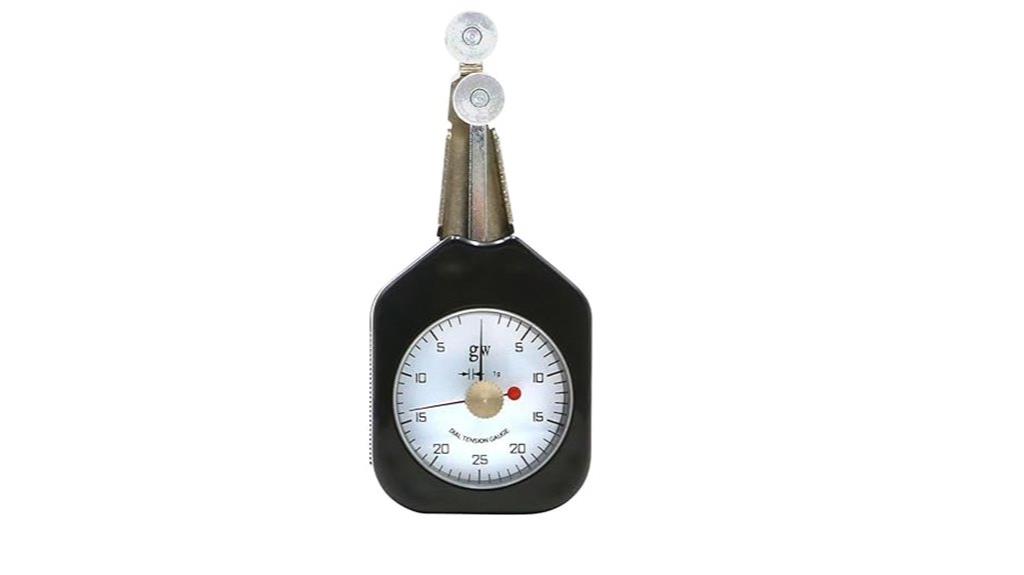
The SHAHE DTF Yarn Tension Meter stands out for its precise double pointer design, making it ideal for textile professionals who need accurate tension measurements. Its range of 20-250 gw and minimum scale of 10 gw ensure reliable readings, especially for small metal lines. Crafted from durable alloys and ABS, it’s built to last while feeling comfortable in hand. The mechanical dial provides quick, direct readings, and the outer dial can be rotated to zero for calibration. Its compact, lightweight design allows single-hand operation, making tension testing efficient and portable for various textile applications. This meter truly combines precision and convenience for industry use.
Best For: textile industry professionals and technicians requiring precise yarn tension measurement, especially when testing small metal lines.
Pros:
- Accurate double pointer design ensures reliable tension readings
- Durable construction from alloys and ABS for long-term use
- Compact, lightweight, and easy to operate with one hand for enhanced portability
Cons:
- Limited to a range of 20-250 gw, may not suit very high tension needs
- Mechanical dial may require periodic calibration for maintained accuracy
- Designed primarily for small metal lines and yarn, less suitable for larger or different materials
Clover 9506 5 in 1 Sliding Gauge with Nancy Zieman, 9.13 x 4 x 0.38

Crafting precise measurements is essential for sewing and craft projects, especially when accuracy truly matters. The Clover 9506 5 in 1 Sliding Gauge with Nancy Zieman is a versatile tool that measures 9.13 x 4 x 0.38 inches, making it compact and easy to handle. It allows for precise marking of buttonholes, seam allowances, hems, circles, and T-gauges, streamlining multiple tasks with one device. Made from durable plastic, it offers reliable performance across various projects. Its adjustable features, including measurements from 0 to 5 inches in 1/8-inch increments, help guarantee perfect fits and professional-looking results every time.
Best For: hobbyists and professional crafters seeking a versatile, precise measuring tool for sewing, scrapbooking, card making, and paper crafts.
Pros:
- Multifunctional with features for marking buttonholes, seam allowances, hems, circles, and straight lines.
- Adjustable from 0 to 5 inches in 1/8-inch increments for precise measurements.
- Durable plastic construction with a compact, lightweight design for portability and ease of use.
Cons:
- May require careful handling to maintain measurement accuracy over time.
- Limited to measurements up to 5 inches, which might not suit larger projects.
- Some users might find the plastic material less sturdy compared to metal tools.
Superior Threads TOWA3-M Bobbin M Style Tension Gauge
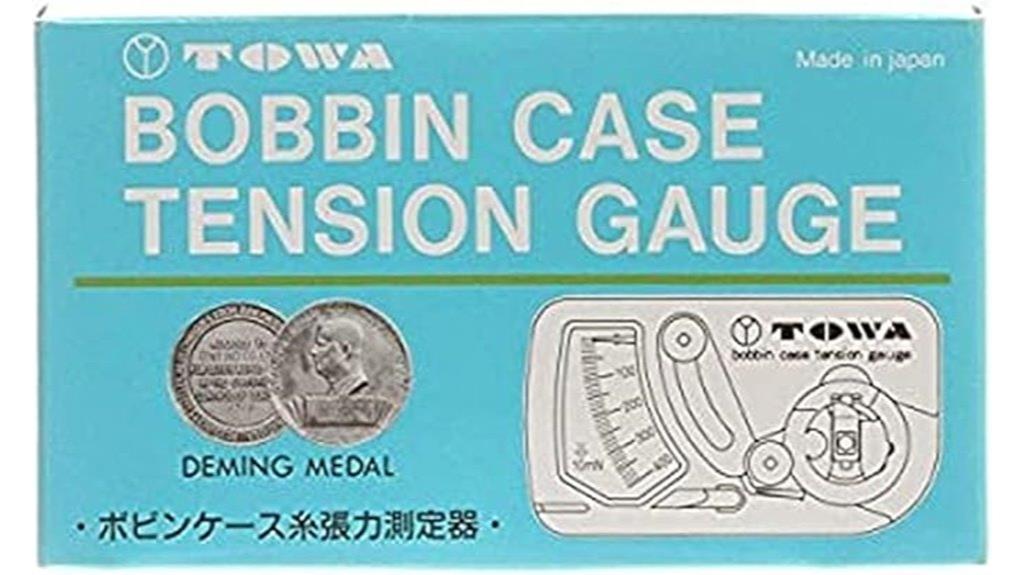
For those seeking precise control over their thread tension, the Superior Threads TOWA3-M Bobbin M Style Tension Gauge stands out as a reliable tool. It measures bobbin tension accurately for M-style bobbins used in machines like A-1, Gammill, and HandiQuilter. Made in Japan from durable plastic, it’s simple to use without any setup required. Whether you’re working on embroidery or long-arm quilting, this gauge helps guarantee consistent tension for quality results. Its compact, lightweight design (just 1.76 ounces) makes it easy to handle. With a high customer rating of 4.6 stars, it’s a trusted choice for achieving perfect thread tension every time.
Best For: sewists and quilters seeking precise, consistent bobbin tension for M-style bobbins across various machines like Gammill, HandiQuilter, and Innova.
Pros:
- Easy to use without setup, saving time and effort
- Durable, high-quality plastic construction made in Japan
- Compact and lightweight for comfortable handling and portability
Cons:
- Requires battery power, which may need replacement over time
- Limited to M-style bobbins, not compatible with other bobbin types
- May be less precise if not calibrated correctly or used improperly
Dritz 3100 14 in 1 Measuring Gauge, Silver
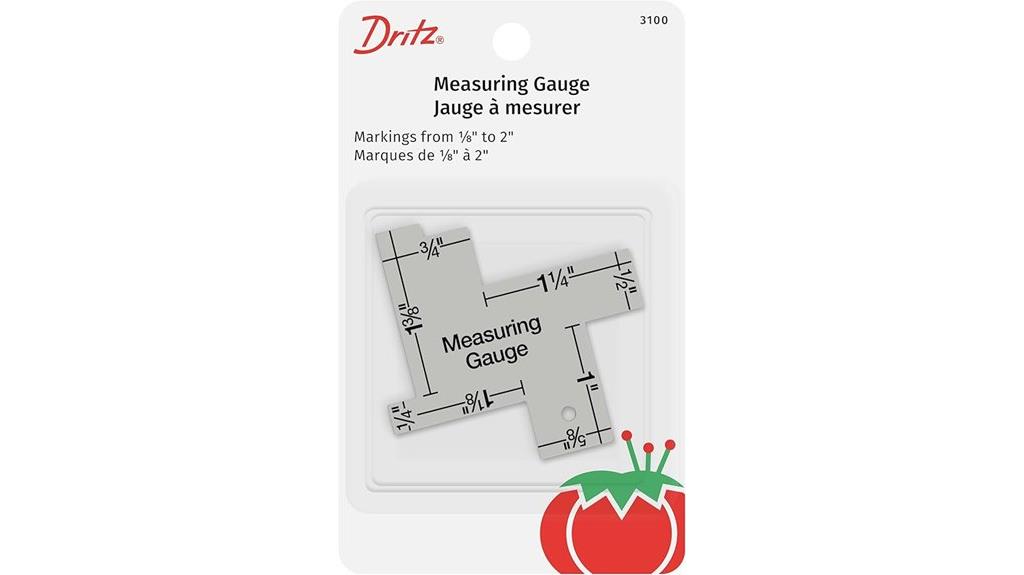
If you need a compact, versatile tool to measure seam allowances and small fabric details with ease, the Dritz 3100 14-in-1 Measuring Gauge is an excellent choice. Made of lightweight aluminum, it features 14 measurements from 1/8 inch to 2 inches, with markings on both sides for added flexibility. Its small size (5.5 x 3.2 x 0.1 inches) and low weight make it easy to handle and store, even attaching to key rings. Ideal for quilting, seam allowances, and marking corners, this gauge helps improve accuracy and efficiency, making it a valuable addition to any sewing kit.
Best For: sewists, quilters, and sewing instructors seeking a compact, precise measuring tool for seam allowances and small fabric details.
Pros:
- Lightweight and compact, easy to carry and store
- Versatile with 14 different measurements on both sides
- Durable aluminum construction ensures longevity and stability
Cons:
- Sharp edges require careful handling to avoid injury
- Measurement markings may wear over time with frequent use
- Thin profile might be prone to damage if stored improperly
CGOLDENWALL Silk Screen Printing Tension Meter
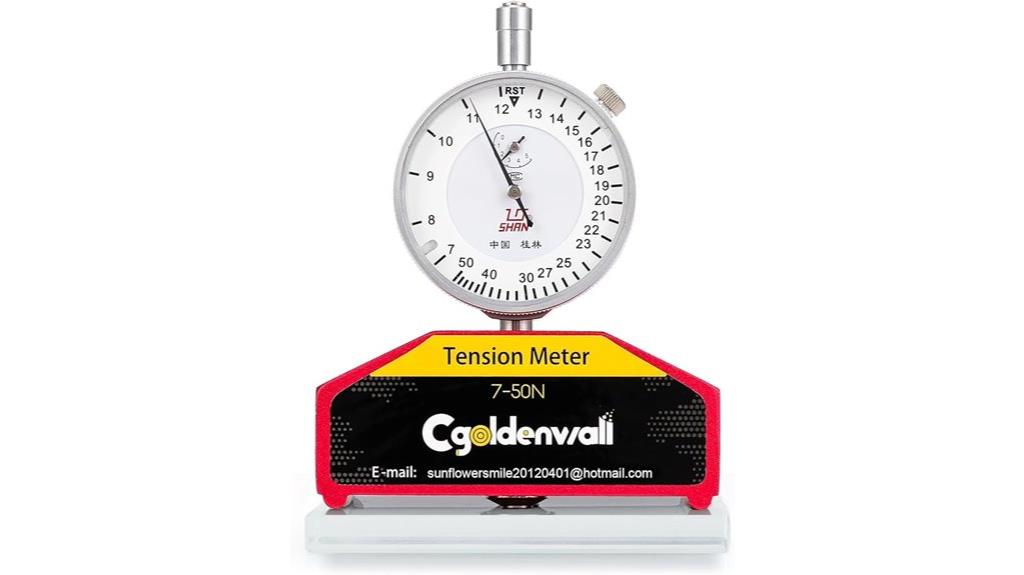
The CGOLDENWALL Silk Screen Printing Tension Meter stands out for its high precision and reliable measurements, making it an ideal choice for professionals who need accurate mesh tension readings. With a measurement range of 7-50N, it provides dependable, consistent results essential for quality silk screen printing. Its correction zero feature helps maintain calibration, and its sturdy metal construction ensures durability. Weighing just 2.55 pounds and measuring 10.63 x 9.17 x 4.02 inches, it’s portable and easy to handle. Since it doesn’t require batteries, you can use it anytime without concern. Overall, it’s a trusted tool that guarantees precise tension measurements for excellent printing results.
Best For: professional silk screen printers and quality control specialists who require precise mesh tension measurement for optimal printing results.
Pros:
- High accuracy with a measurement range of 7-50N ensures dependable tension readings.
- Durable metal construction and correction zero feature maintain calibration and long-term reliability.
- Portable and lightweight design (2.55 pounds, 10.63 x 9.17 x 4.02 inches) allows for easy handling and on-site use.
Cons:
- Disassembly or re-fixing is not permitted, which may limit calibration adjustments.
- No batteries are required, but this means the device is solely mechanical and may lack additional electronic features.
- Limited to tension measurement; does not include additional functions like digital readouts or data storage.
14-in-1 Measuring Gauge for Sewing and Quilting
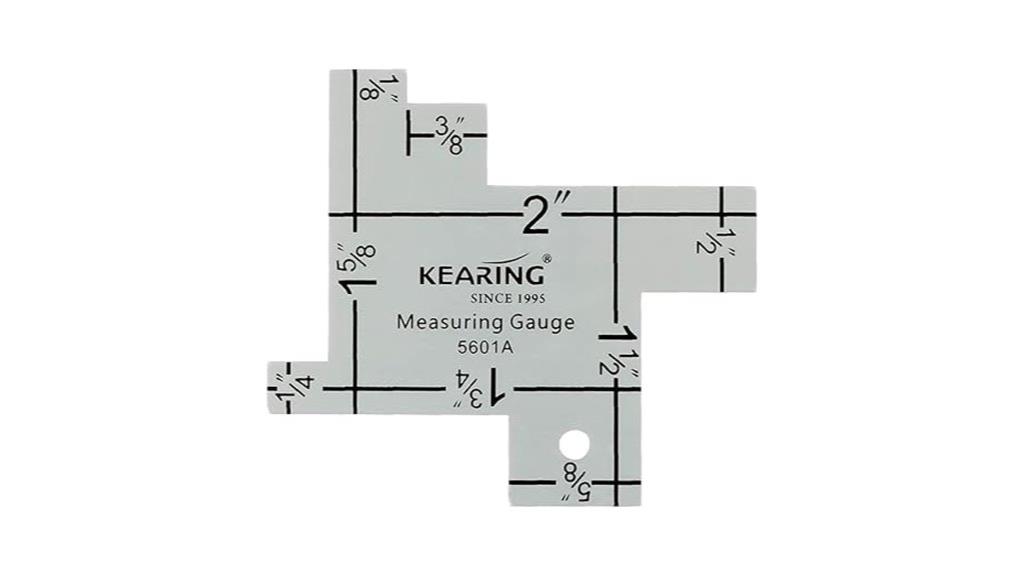
A 14-in-1 measuring gauge is an essential tool for anyone involved in sewing and quilting, especially when precision matters. Made of high-quality aluminum, it’s lightweight yet sturdy, with measurement ranges from 1/8 inch to 2 inches. It features notches for seam allowances, hems, and spacing, plus a 1/8-inch hole for easy hanging or attachment. I use it to check small measurements, ensure seam accuracy, and guide fabric cutting. Its compact size makes it perfect for on-the-go crafting. Although some users report quality issues, overall, it’s a versatile, convenient tool that streamlines measurements and enhances accuracy in sewing projects.
Best For: crafters, quilters, and sewists seeking a portable, precise measurement tool to improve accuracy and efficiency in their projects.
Pros:
- Multifunctional with 14 different measurement features in one compact tool.
- Made of lightweight yet durable aluminum for long-lasting use.
- Easy to carry and store with a hole for hanging or attaching to a keychain.
Cons:
- Some users report arriving bent or with quality issues due to packaging and handling.
- Small size increases the risk of losing the tool if not secured properly.
- Lacks a dedicated hole for hanging or clipping, requiring modification for convenience.
Dritz 658 Seam Gauge with Point Turner, 7-Inch

Designed for sewists and tailors who need precise measurements, the Dritz 658 Seam Gauge with Point Turner offers a compact 7-inch metal ruler that combines versatility and accuracy. Its point turner helps gently push out corners on collars, lapels, and cuffs, ensuring neat, professional finishes. The sliding right-angle marker stays securely in place, making it easy to measure hem depths, seam allowances, buttonhole spacing, and tuck or pleat spacing consistently. This small, durable tool is essential for detailed sewing tasks, providing precise measurements and easy corner turning. Its multifunctionality makes it a valuable addition to any sewing kit, ensuring accuracy and efficiency in garment construction.
Best For: sewists and tailors seeking a compact, precise measurement tool for detailed garment construction and finishing touches.
Pros:
- Compact 7-inch size easily fits into sewing kits and storage compartments
- Includes a point turner for gentle corner shaping on collars, cuffs, and lapels
- Sliding right-angle marker ensures consistent measurements for hems, seam allowances, and buttonholes
Cons:
- May be too small for users preferring larger, more extended rulers for broader measurements
- Metal construction might be less comfortable for prolonged use compared to plastic or foam grips
- Limited to 7 inches, which may not accommodate larger projects requiring longer measurement tools
Dritz Seam Gauges 6in Sewing Accessories, None
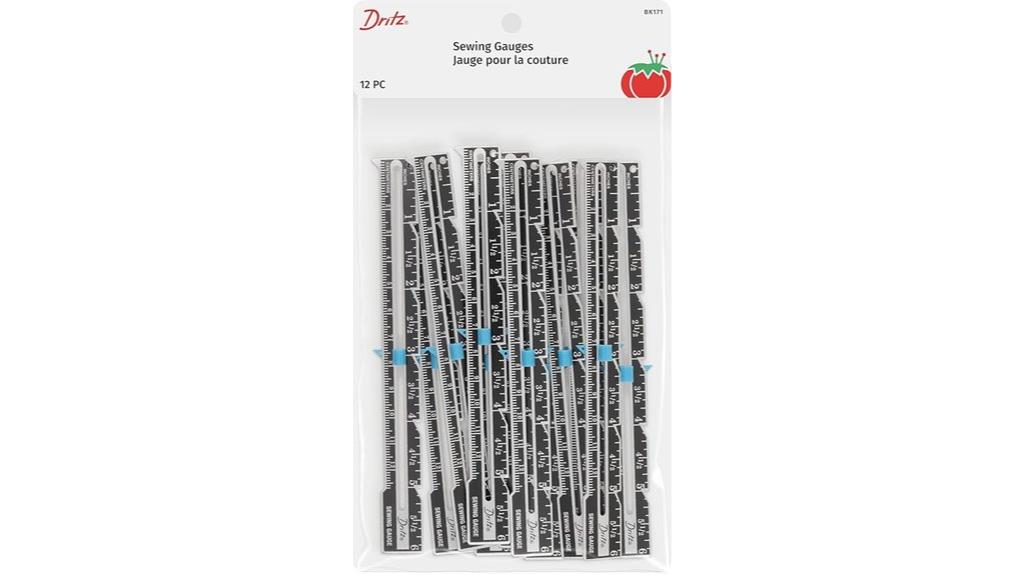
If you’re serious about precise sewing measurements, the Dritz Seam Gauges 6-inch sewing accessory is an excellent choice. It’s compact, lightweight at just 3.2 ounces, and measures 8.7 x 4.84 x 0.59 inches, making it easy to handle and carry. Designed specifically for measuring seam allowances, hems, and other sewing details, it helps guarantee consistency in your projects. With a high rating of 4.8 out of 5 stars from 110 reviews, users praise its accuracy and durability. Whether you’re a beginner or an experienced sewer, this tool offers reliable measurements to improve your sewing precision.
Best For: Anyone seeking precise, portable measuring tools for sewing projects, from beginners to experienced seamstresses.
Pros:
- Highly accurate measurements for consistent sewing results
- Compact and lightweight design for easy handling and portability
- Durable construction with positive customer reviews for reliability
Cons:
- Limited to 6-inch measurements, which may not suit larger projects
- May require careful handling to avoid wear over time
- Price may vary across retailers, potentially affecting affordability
Dritz 620 Sewing Gauge

The Dritz 620 Sewing Gauge stands out as an essential tool for sewists and dressmakers who need precise measurements during their projects. Its sliding measure allows me to mark hems, tucks, pleats, and buttonholes with accuracy. The sliding marker stays in place, ensuring consistent measurements every time. Compact and lightweight at just 0.32 ounces, it’s easy to handle and use without batteries or assembly. I appreciate its durability and how it improves my sewing precision, saving time and reducing errors. Whether I’m hemming pants or creating intricate designs, this gauge is a reliable, user-friendly addition to my sewing kit.
Best For: sewists, dressmakers, and crafters who need precise, consistent measurements for hemming, tucks, pleats, and buttonholes.
Pros:
- Accurate and reliable measurements with a sliding marker that stays in place
- Compact, lightweight, and easy to use without batteries or assembly
- Durable construction that enhances sewing precision and saves time
Cons:
- Plastic slider may be less sturdy with heavy or rough use
- Limited measurement length, suitable mainly for small to medium projects
- Some users may find it less versatile compared to larger or more complex measuring tools
Factors to Consider When Choosing Fabric Shrinkage Testers

When selecting a fabric shrinkage tester, I focus on measurement accuracy, ensuring it meets industry standards. I also consider how compatible the device is with different materials and how easy it is to operate. Finally, I look at durability, price, and brand reputation to make a well-rounded choice.
Measurement Accuracy Standards
Choosing a fabric shrinkage tester requires careful attention to measurement accuracy standards, as these guarantee the reliability of results. I look for testers with a precision of ±0.5% or better to ensure consistent, trustworthy measurements. Regular calibration, following industry guidelines, is essential to maintain accuracy over time. I also verify that the tester complies with recognized testing standards like AATCC TM96 or TM135, which specify acceptable accuracy tolerances. The measurement scale’s resolution must be fine enough to detect small dimensional changes, providing precise data. Additionally, I consider environmental control features, since temperature and humidity can affect measurements. Ensuring these standards are met helps me confidently assess fabric shrinkage, leading to better quality control and a perfect fit.
Material Compatibility Tips
Selecting the right fabric shrinkage tester isn’t just about measurement accuracy; it also depends on whether the device works well with the specific fiber content. Different fabrics like cotton, wool, silk, or synthetic blends have unique properties, so I always check compatibility to get reliable results. For delicate or heat-sensitive fabrics, I look for testers designed to prevent damage during testing. It’s also important to choose a tester with measurement scales suited to the fabric’s typical dimensional changes. I verify that the materials of the tester won’t react chemically or physically with the fabric, ensuring test integrity. Ultimately, I select testers tailored to the specific testing method—whether laundering, dry cleaning, or heat exposure—to guarantee valid and consistent shrinkage measurements.
Ease of Use Features
Ease of use is a crucial factor when picking a fabric shrinkage tester because it directly affects the accuracy and efficiency of your measurements. I look for testers with clear, easy-to-read measurement scales that allow quick readings without complex calculations. Simple operation mechanisms, like straightforward locking and releasing features, help minimize user effort and reduce errors. Ergonomic designs, such as lightweight handles or foldable parts, make testing more comfortable and manageable. I also prefer devices with minimal setup requirements—no batteries or calibration needed—to ensure fast, hassle-free testing. Intuitive marking and measurement features are essential for accurate assessments, even if you’re new to fabric testing. These ease of use features save time and increase reliability, making your testing process smoother and more dependable.
Durability and Build Quality
Durability and build quality are essential when investing in a fabric shrinkage tester because they directly impact the device’s lifespan and measurement accuracy. A well-constructed tester uses high-quality materials like metal or reinforced plastic to withstand repeated use and rough handling. This sturdy design reduces wear and deformation, helping maintain precise measurements over time. Heavy-duty features, such as heat-treated steel components, boost the tester’s durability in demanding environments, whether in labs or factories. Additionally, sturdy, scratch-resistant lenses and secure locking mechanisms ensure calibration remains intact, safeguarding measurement consistency. The overall robustness minimizes the risk of damage from accidental drops or mishandling, providing reliable performance across multiple tests. Prioritizing build quality guarantees that your investment delivers long-term accuracy and dependability.
Price and Brand Reputation
When choosing a fabric shrinkage tester, considering the price and brand reputation can help you find a reliable option that fits your needs. Established brands with strong reputations often deliver more accurate and dependable testers because they adhere to higher quality standards. While lower-priced options might seem tempting, they could sacrifice accuracy or durability, which can affect your results. Reputable brands usually provide better customer support, warranties, and clear product details, giving you more confidence in your purchase. Premium pricing often indicates advanced features or higher precision, especially important for professional testing. Comparing prices across brands ensures you select a tester that balances affordability with trusted quality, helping you achieve consistent, reliable measurements without overspending.
Frequently Asked Questions
How Do I Interpret Results From Different Fabric Shrinkage Testers?
When I interpret results from fabric shrinkage testers, I focus on the percentage change in dimensions before and after washing. A lower percentage means less shrinkage, indicating better quality and fit. I compare these results against industry standards or my desired threshold. If the shrinkage exceeds expectations, I consider it a red flag. Consistent, minimal shrinkage assures me the fabric will maintain its size and shape after laundering.
Are Digital or Analog Testers More Reliable for Fabric Shrinkage?
Think of digital testers as the sharp-eyed hawks and analog testers as the steady old owls. I find digital fabric shrinkage testers more reliable because they offer precise, quick readings, reducing human error. Their digital display acts like a clear window into the fabric’s behavior. While analog testers have their charm, I trust digital ones for consistent accuracy, especially when ensuring your garments fit perfectly every time.
Can Fabric Shrinkage Testers Measure Multiple Fabric Types Accurately?
Yes, fabric shrinkage testers can measure multiple fabric types accurately if they’re versatile and calibrated properly. I’ve used testers that adapt to various textiles, from cotton to polyester, ensuring precise results across materials. It’s essential to choose a device with adjustable settings and proper calibration to get consistent, reliable measurements, no matter the fabric type. This way, you can confidently assess shrinkage and maintain quality standards.
How Often Should I Perform Fabric Shrinkage Testing During Production?
I recommend performing fabric shrinkage testing at key production stages, ideally before cutting, after dyeing, and during final inspection. This helps catch any unexpected shrinkage early, saving time and costs later. I also do spot checks periodically throughout production to guarantee consistency. Regular testing gives me confidence that the fabric will fit perfectly and maintain quality, minimizing returns and ensuring customer satisfaction.
What Maintenance Is Required to Keep Fabric Shrinkage Testers Accurate?
A stitch in time saves nine, and regular maintenance keeps your fabric shrinkage testers accurate. I check calibration regularly, clean the equipment after each use, and inspect for wear and tear. Lubricate moving parts as needed and follow the manufacturer’s guidelines for servicing. Staying proactive guarantees your testers give reliable results, helping you maintain quality and fit in every batch. Consistent care truly keeps your tools in top shape.
Conclusion
Choosing the right fabric shrinkage tester is key to ensuring your projects turn out perfect. With so many options, it’s important to pick one that fits your needs and helps you catch issues early. Remember, a stitch in time saves nine—investing in a good tester now can save you headaches later. Don’t cut corners; a small tool can make a big difference in achieving quality and a flawless fit every time.

